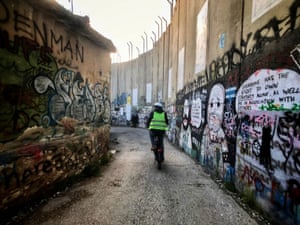Are you annoyed by the anti-motorcycle barriers or speed bumps on your local bike path? Spare a thought for Palestinian bicycle advocates. According to the UN, the Israeli occupation of the West Bank imposes 705 obstacles to the free movement of Palestinians.
These obstacles include military checkpoints where only those with permits can pass, a 440-mile separation barrier, and roving patrols that can turn a joyous bike ride into humiliating roadside detention.
For Palestinian paramedic Sohaib Samara and other cyclists in the region, pedalling is not just about fresh air and exercise; it’s intensely, unavoidably political.
On one ride when he and a friend were pulled over by an Israeli army patrol, Samara says he heard the soldiers asking, in Hebrew, whether they should shoot the pair in the arms.
“I was not afraid for myself because at the end of the day, if I’m gonna die, I’m gonna die,” said Samara. “But I was worried that if I tried to defend myself or even argue [that the soldiers] had no right to stop us, they might later blow up my family’s house.”
“Your brain starts to wander in dark places when, really, you just want to keep cycling,” he added.
Riding around the West Bank is a way of thumbing the nose at occupation, but it is also a way of connecting with the land; bicycling as a form of affirmative action.
In 2016, Samara launched Ramallah Riders, a Facebook group for would-be cyclists in the West Bank town of Ramallah, six miles north of Jerusalem. Four years later, the group now has 3,000 members and, in recognition of wider West Bank membership, is today known as Cycling Palestine.
When I lived in Jerusalem for six months in 1984 – having ridden to Israel on my Claud Butler Majestic touring bike – I used to ride out to West Bank villages on weekends with an Israeli friend. We were welcomed with handshakes and mint tea. We were exotic, but we were on bicycles, a form of locomotion that identified us as harmless idiots to Palestinians and Israelis alike.
Israel has since had something of a bicycling boom. Along with amenities such as a billionaire-backed velodrome, it also now has protected cycleways, and the Giro d’Italia pro-cycling race spent three days in the country in 2018. But despite the best efforts of Cycling Palestine, the West Bank remains a bicycling backwater.
“You’re an old man now,” the then 30-year-old Samara was told by family and friends, worried about his love of cycling. “You should be working, starting a family,” they told him. “[Cycling] is stupid.”
Ignoring the barbs, Samara continued to cycle.
“We’ve been doing this for over four years now; people have lost hope in us,” joked Malak Hasan, Cycling Palestine’s co-organiser. “They’re now more accepting.”
I was speaking to Samara and Hasan in the foyer of the Manger Square Hotel in Bethlehem after an e-bike tour of the city, a new weekly organised ride which had taken me past highlights such as Banksy’s Walled Off Hotel, a greater draw for some than the town’s Church of the Nativity.
The e-bike tour aims to get tourists out of buses to see the “real” Bethlehem.
“Bicycling [in Palestine] is a tool for change,” said Hasan. “Environmentally, it’s good; socially, it’s amazing. It’s the best icebreaker — whenever we are on the road, someone wants to talk to us, find out who we are.”
Cycling Palestine’s weekly rides are for locals and leisure but, according to Hasan, “lots of people have adopted [cycling] as a lifestyle; they now go to work on bikes.”
This isn’t always easy in the West Bank. It’s hilly, it’s hot for much of the year, and cycling is still considered an odd thing to do, especially for women.
“Because I’m visibly Muslim,” said the hijab-wearing Hasan, “people are always throwing comments in my face [such as] ‘how could you be a good Muslim showcasing yourself like this?'”
The cultural stigma – a barrier to bicycling – is lower for men. “Men can embark on amazing adventures because no one will be asking where this man is sleeping. Where is he going? Is he alone?”
After a four-day, 300-mile group ride in 2017 from the Qalandiya refugee camp near Ramallah to Jordan’s Aqaba, Hasan returned to stinging rebukes. She was one of only two women on the 11-person trip.
“Most of the comments were like, ‘how could you sleep in tents and on deserted roads with nine men?’ The expectation is for a woman to be at home, taking care of babies, being decent and modest.”

Hasan’s husband doesn’t cycle, “but,” she stated proudly, “he’s very supportive”.
She learned to love cycling when studying for a master’s degree in communication in Swansea.
“I would feel so overwhelmed with studying, and then get on the bike and feel very relaxed. When I came back [to Palestine], I wanted to go back to biking, but I was terrified of people attacking me. I stopped biking until I found Sohaib. We went on a bike ride, and have never stopped cycling. It’s amazing.”
Amazing, but restricted. “Between each valley and the next, there’s [an illegal Israeli] settlement,” said Hasan. “If you want to cycle for 50km you will be faced with at least two checkpoints and a settlement, maybe a surveillance tower, patrols; continuity is always broken.”
One of Cycling Palestine’s recent tours was a multi-day, 70-person tour following the full length of the separation barrier: their own form of rolling resistance.
“It is our duty to keep our relationship with this land,” said Samara. “If we stop moving around, the occupiers will steal more of it.”